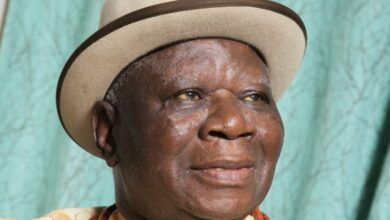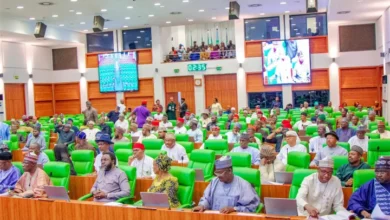Using culture as springboard for development, by Kazeem Akintunde |

The city of Abeokuta in Ogun State literally stood still on April 5, 2025 during this year’s Lisabi Day celebration. An annual event meant to showcase the rich cultural heritage of the Egbas, and in honour of their hero, Lisabi Agbongbo Akala, a warrior who led the resistance against the oppressive old Oyo Empire in the 19th century. This year’s celebration stood out as the most memorable so far, as it was marked with glamour and glitz. Gaily dressed Egba sons and daughters, including the crème-de-la-crème were in attendance to celebrate with the paramount rule of Egbaland, Oba Adedotun Aremu Gbadebo. The former President, Chief Olusegun Obasanjo; the Ogun state Governor, Prince Dapo Abiodun, as well as the former Governor, Ibikunle Amosun, were all present at the occasion. It was a day to showcase the rich cultural heritage of the Egbas to the world. This year’s celebration, themed #Ègbáliganza2025, merged cultural pride with modern flair. The grand finale dazzled with glamorous fashion displays featuring traditional Ofi, Adire, and Afrocentric designs. Prominent figures including Nollywood stars, politicians, and business moguls showed up in luxurious aso-oke, agbadas, and elaborate gele, turning the event into a runway of Egba heritage.
The display of fashion and style was not just for the fun of it. It was a well-thought-out journey of bringing back the regular clothes of the old Egba warriors, chiefs and high net-worth individuals – to showcase a part of the unique beauty of the culture of Egbaland. All the attires on display were curated from the archives of the Egba tradition. These affirm the uniqueness of Lisabi Festival in its own way, and with its unique target audiences.
At the heart of this cultural renaissance using Egbaliganza, is the plan to build a $1 billion value chain using Ẹ̀gbáliganza to establish indigenous textile industries, particularly in Adire and other traditional fabrics. Through structured training programmes, funding support, and market expansion strategies, the event aims to empower local artisans, designers, and textile entrepreneurs, positioning Ẹ̀gbáland as a global fashion and culture hub.
The Alake of Egbaland and other high chiefs added royal elegance, adorned in majestic regalia and coral beads, reflecting the deep-rooted traditions of the Egba people. It was a celebration many have now come to identify with. Indeed, there is no better way to celebrate and honour Lisabi, who has now been acknowledged as a hero amongst the Egbas.
The Egbas, found mostly in the present-day Ogun State, are a sub-group of the Yoruba tribe in South-West Nigeria. They are traditionally farmers and hunters, spread across more than 100 forest settlements known as Egba Forests surrounding the old Oyo-Ile. These settlements, which include Gbagura, Ake, Oke Ona groups amongst others, formed a loose federation of Egba. Over time, the Egba people became vulnerable to attacks and pledged allegiance to the powerful Oyo Empire for protection.
However, the Alaafin of Oyo at that time was a tyrannical leader who treated the Egbas like second-class citizens. The Alaafin exploited the Egbas through excessive taxes, forced labour, and suppression of some of their cultural practices, enforced by his military-style tax collectors, known as the Ajeles or Ilaris. While the Egbas bear the brunt of having to pay taxes and royalties to Oyo for protection and in the process, have little or nothing to take care of themselves and their families, the Ilaris were notorious for their lavish and reckless lifestyles, funded by the hard-earned resources of the Egbas. They also engaged in slave trade, which they used to further enrich themselves and the Oyo rulers.
Lisabi, a resident of Igbein, who was born in Itoku, became the hero the Egbas needed at their most trying time. Although a farmer by trade, he also had great physical presence and was strong and huge like a giant. He was also a soldier known for his military prowess in the war fought against the Oyo Empire. When many of the Egbas could no longer bear the oppressive regime of the Ilaris, Lisabi was called upon and he eventually led the Egbas to victory against the old Oyo Empire. He was heralded and celebrated by his people. Although his end is shrouded in mystery, as there are several different accounts of his death, he remains a legendary figure whose bravery, leadership and tactical genius are remembered and celebrated by the Egba people to this day. His legacy is immortalized by the Oriki ‘Egba Omo Lisabi’, which means ‘Egba, the children of Lisabi’.
For the past 38 years, Lisabi Festival has been celebrated by the Egbas annually in Abeokuta with pride, with cultural activities that bring together the people, both at home and in the diaspora. Lisabi festival amongst the Egba people emphasizes leadership, selflessness, unity, cooperation and entrepreneurship in all aspects of the celebration in the memory of what Lisabi accomplished centuries ago.
This year’s Lisabi Festival is a week-long event which featured a visit to the Igbo Lisabi (the shrine), which is opened to a few initiates. There was also a city procession in Abeokuta by the youths of different town representatives in a street carnival. This involved people cooking and having fun. Asides from the above, there were also inter-clan and village competitions, including Ayo Olopon, which is yearly sponsored by Eagle Aromatic Schnapps, as well as Eke/Ijakadi (local wrestling competition).
However, the mainstay of Egba’s economy, which is the Adire textile manufacturing, has been dealt a heavy blow by China, as a replica of Adire is now being manufactured and exported to Nigeria. Egba sons and daughters were shocked when they discovered that the Chinese have started manufacturing Adire textile and exporting the same to Nigeria and at a cheaper rate.
Also Read
Many of the Adire textile makers had to plead with the federal government recently to ban the importation of Chinese Adire textiles into Nigeria as they alleged that they are gradually being pushed out of the business.
Indeed, the production of Adire/Kampala textiles, also known as tie-and-dye, is a craft industry synonymous with the people of Egbaland in Ogun Central Senatorial District, where it all began over 200 years ago. Aside from helping to preserve the distinctive and rich cultural heritage of the Nigerian people, it is one local industry that is providing jobs for thousands of people and putting food on their tables. However, the importation of the alleged imitation of Adire fabric from China, which is said to be cheap but of inferior quality and materials, has almost forced most indigenous traders out of the business.
To register their displeasure, the local producers of the fabrics in June last year closed their shops and stormed the streets in Ogun State, alleging imitation of their designs and adulteration of the products by the Chinese. From the Itoku market, the hub of the business, they marched to the palace of the Alake, the paramount ruler of Egbaland, Oba Adedotun Gbadebo, seeking a drastic measure to stop the collapse of the age-long trade.
However, what is encouraging the influx of imported fabrics is the fact that most textile companies in Nigeria are comatose, and the premium quality cotton fabric used in making the Adire is now being imported. The implications of this are that because these cotton materials are expensive, the end-products cannot be cheap. Again, the dye and other chemicals used in the production of Adire are also imported, making the Adire textile more expensive than the Chinese version which is simply the printing of Adire designs on synthetic materials. It is the belief of most Adire traders that if the government can resuscitate our local textile industries, or even establish one in Abeokuta, the fabrics would be bought at a cheaper price, and this would checkmate the cases of people buying the cheaper imported fabrics. Oba Gbadebo assured the native traders that efforts would be made to reach out to the federal government on the possibility of banning imported Adire into the country from China.
With the Adire/Kampala traders now fully integrated into the Lisabi day celebration, the traders should also up their game by thinking outside the box to generate ideas on how to improve the quality of their products so that they have a comparative advantage globally. As a way of encouraging local producers of Adire and Kampala tie-and-dye materials, Governor Abiodun and his wife, Bamidele, have fully embraced the wearing of Adire textile materials. He has also made it mandatory for Ogun State workers to wear Adire to work on Fridays.
With the fresh impetus given to the Lisabi Day Celebration, more private companies should be brought in as sponsors of the event and given wider coverage by both local and international news channels.
It should be modernised in such a way that local and foreign tourists would be drawn to Abeokuta to be a part of the yearly celebration.
This would serve as another avenue to grow the economy of the state, as locals in the hotel business, local restaurants, and cab drivers, amongst others, would reap bountifully from the festival.
Both the federal and state governments must be part of the yearly celebration as it offers a veritable means of using our cultural heritage and tourism to boost the economy.
There is now a healthy competition between the Ijebus and the Egbas in the area of cultural and traditional practices as the Ijebus also boast of a rich and colourful Ojude Oba celebration. As expected, the real competition between the Ijebus and the Egbas, should begin, as both tribes try to outdo one another in their bid to use culture and tourism to fast-track the development of their cities. Using these means to promote our culture whilst boosting tourism is the way to go, and I am loving it.
See you next week.
Post Views: 2






